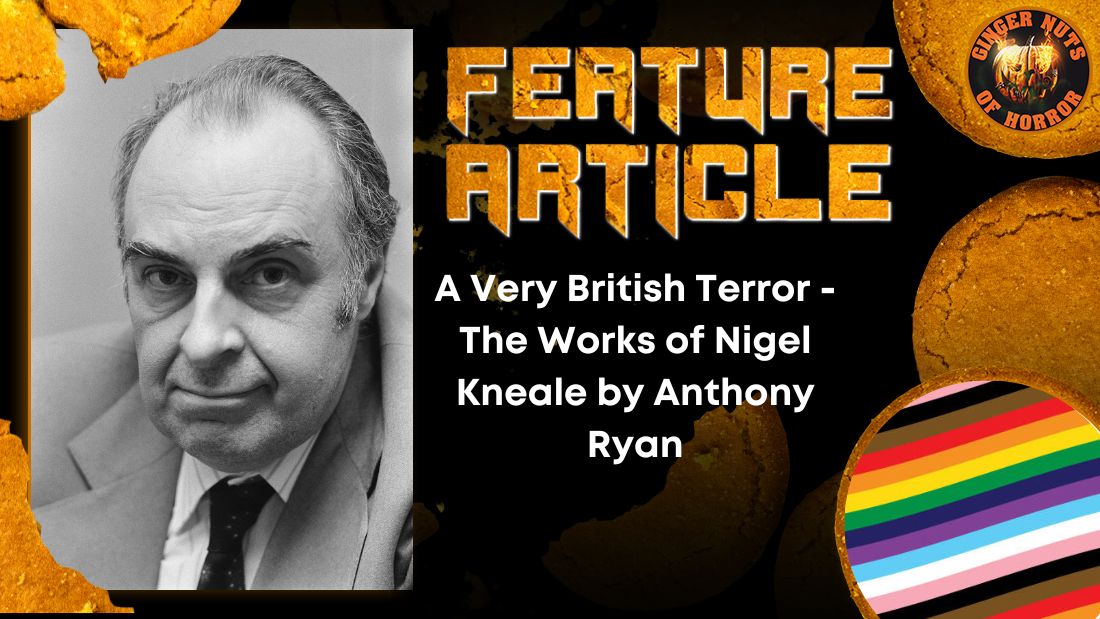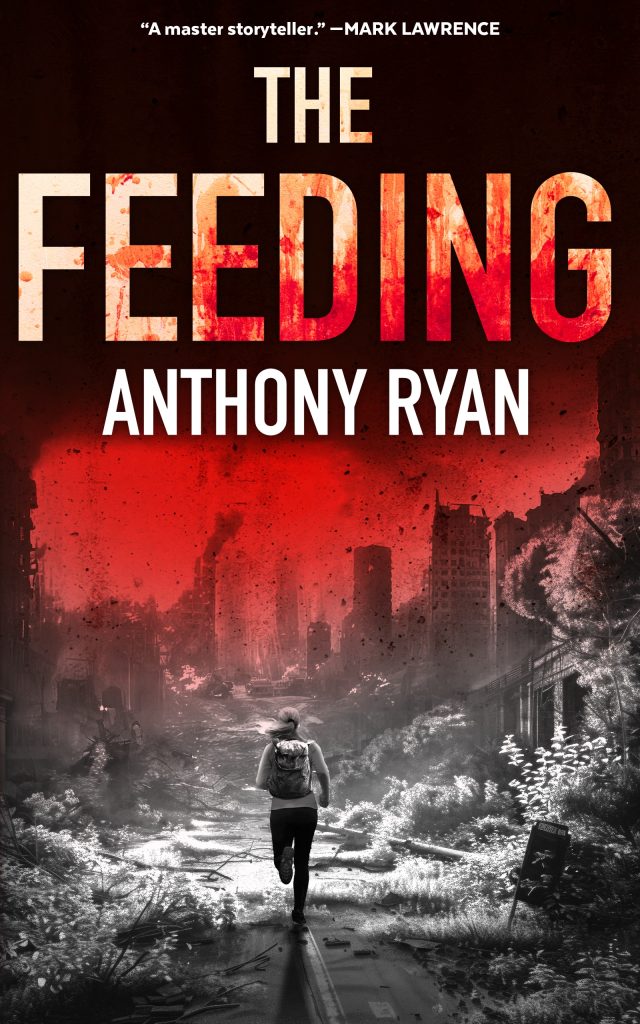Today, we welcome author Anthony Ryan to Ginger Nuts of Horror to celebrate the release of his new novel The Feeding, described by Philip Fracassi as “A madly entertaining amalgam of locked-room mystery, heart-racing thriller, and terror-inducing horror show that will keep you up late into the night and darken your dreams long after you turn the last page” With a fascinating article on the woks of Nigel Kneale. Check out my review of The Feeding here.
A Very British Terror – The Works of Nigel Kneale by Anthony Ryan
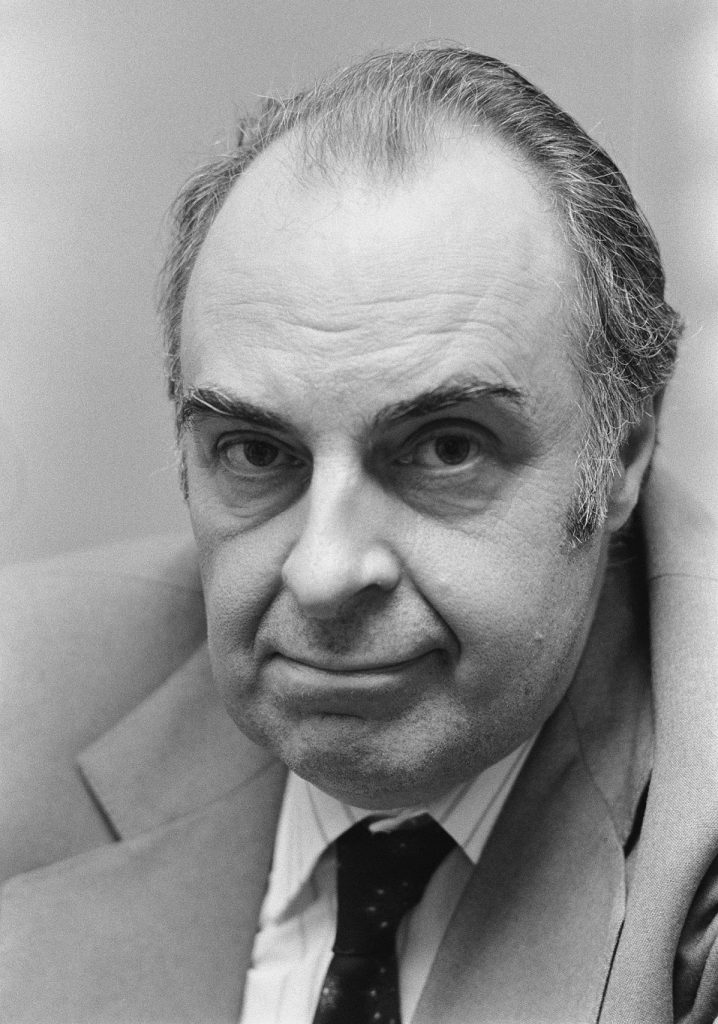
One morning in 1979, having completed a typically reluctant trudge to school, I discovered a playground knot of kids excitedly discussing the fact that they had seen a man get shot in the head on television last night. Amongst the bloodthirsty babble – children are always fascinated by violence – I discerned the words ‘gangs’, ‘aliens’, and ‘Ringstone Round’. The show that had got them so riled up was called Quatermass, which I discovered later, represented the last incarnation of the most successful character created by British Screenwriter Nigel Kneale.
The following week, I prevailed upon my parents to allow me to watch the second episode of Quatermass and quickly found myself both transfixed and terrified. Much of the plot was lost on a nine-year-old peeking at the TV from behind a strategically placed couch cushion. However, the bleak terror of the world depicted on screen – Britain beset by the twin disasters of societal collapse and genocidal alien attack – gripped me and wouldn’t let go.
This was actually my second exposure to the character of Bernard Quatermass. The first had been an ill-advised late-night viewing of the Hammer Studios version of Quatermass and the Pit via the portable black and white television in my bedroom. After the first ten minutes I had to shout for my dad to come and turn it off because I was too scared to venture from under my bed covers. So, it’s fair to say that Nigel Kneale and I go way back and, as a writer, I’ve only recently appreciated just how deeply his work is imprinted upon my consciousness.
Kneale began his career as a prose writer, winning the Somerset Maughan Award for his short story collection Tomato Cain and Other Stories in 1950. However, he quickly became enamoured of the possibilities offered by the new medium of television, eventually penning the first outing for his titular rocket scientist hero in The Quatermass Experiment which was broadcast by the BBC in 1953.
The story saw Professor Bernard Quatermass, head of the British Experimental Research Group, pitched against an alien infestation rapidly transforming a returned astronaut into an all-consuming plant monster. In this first incarnation, Quatermass is cast in the mould of the driven scientist archetype. Like Frankenstein, his motives can be read as selfish, his focus is entirely on the fate of his recently launched rocket and what means for the future of his project. However, the calamitous and horrifying events that follow the rocket’s return to earth reveal are more compassionate side.
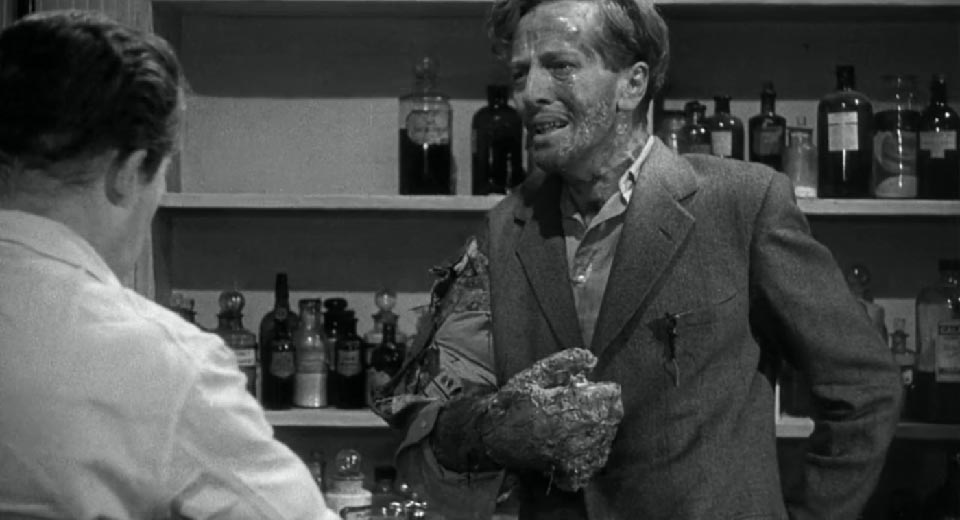
Infused with Cold War paranoia and laced with what would become Kneale’s signature chilly ambience, audience reaction to Quatermass was strong, leading the BBC to commission a sequel. Quatermass II was broadcast the following year and stands as one of the first examples of appointment television. In an age when almost all broadcasts were live and recordings erased as a matter of routine, repeat showings were a rarity and audiences were aware that this was a ‘see it or miss it’ event. Kneale’s tale of a rural chemical plant becoming ground zero for an alien invasion, with its bleak allegory of authoritarian government, left viewers rapt and eager for more.
Quatermass and the Pit followed in 1957, a Pandora’s Box-esque premise concerning an ancient martian spacecraft unearthed beneath a London Tube station. Pit can be seen as Kneale’s take on the ghost story, with the twist that the supernatural elements were in fact illusory and explicable by science. However, this revealed truth turns out to be more terrifying than any mere phantom when Quatermass’s investigations lead to near world destroying consequences.
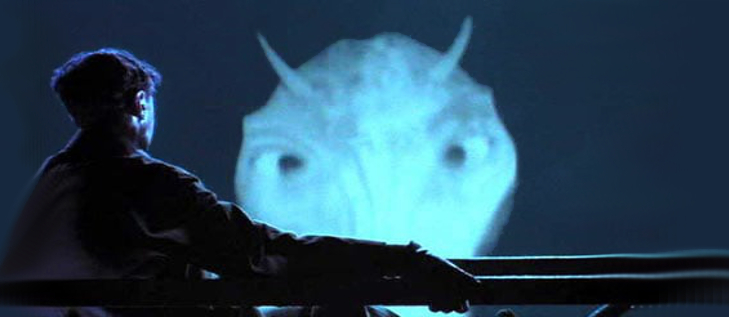
The employment of science to discover the real truth underpinning belief in the supernatural would become a staple theme of Nigel Kneale’s work, as he explained in a later television interview: “behind the apparently irrational [and] superstitious theme there is something real and dangerous.”
This remarkably prolific period also involved an acclaimed and suitably terrifying adaptation of Orwell’s 1984 starring Peter Cushing as Winston Smith. Kneale’s skill in disturbing his audience, especially to the fore in the climactic Room 101 scene, was starkly reflected in complaints received by the BBC, including accusations that the producers were clearly ‘sadists and readers of horror comics.’
Tragically, more than a dozen television plays written for the BBC by Nigel Kneale have been lost, the original video tapes either being discarded or taped over. The most grievous loss is probably The Road (1963), a dark tale of rural folk in the 1600s discovering a track where ghostly voices resonate. Eventually, it is revealed that these are in fact echos from the future, culminating in the terrorised screams of people vainly attempting to flee a nuclear war.
Probably the most notable non-Quatermass survivor is The Year of the Sex Olympics (1968), set in a future where mass broadcasts of pornography are used to satiate the public’s carnal urges in an effort to limit over population. As viewing figures wane, all powerful TV producers create a form of reality television in which murder is deliberately orchestrated, much to the hilarity and delight of the viewing public. The shaky logic of its central premise aside, and despite some over the top acting from Leonard Rossiter and a youthful Brian Cox, Sex Olympics stands as a remarkably prescient vision of how televised entertainment would develop, and degrade, in the decades that followed.
In the 1970s, Nigel Kneale decided to quit the BBC for the independent network ATV, a move that may have been driven by his increasing dissatisfaction with the lack of vision or support he encountered from commissioning editors. The result would be Beasts, an anthology series of six fifty-minute plays on the theme of animalistic horror. The standout episode for many is the starkly unsettling During Barty’s Party, in which a middle-aged couple find themselves besieged in their country cottage by a swarm of highly evolved rats.
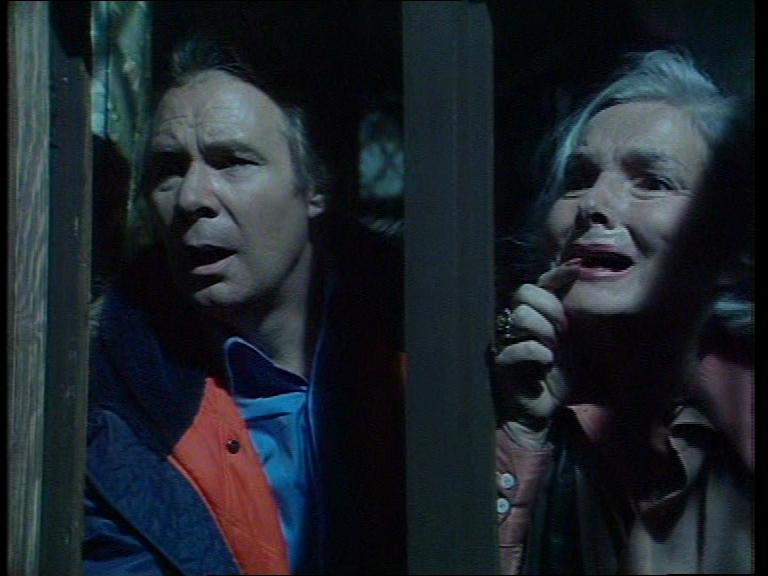
Nigel Kneale frequently made a virtue of domestic or unremarkable settings. His characters often attempt to cling to familiar routines in the face of extraordinary events. The very mundanity of the surroundings serves to accentuate the viewer’s unease. As the comfort of normality is stripped away by increasingly potent and undeniable threats, so the fear heightens. The DNA of this approach can be seen in both the Paranormal Activity and Conjuring movie series.
Taking a Jaws-esque approach to the beastly threat – we never actually see the rats – During Barty’s Party benefits from a clever use of sound and the impressive performances of its two leads; Anthony Bate as Roger and Elisabeth Sellars as Angela. As the scratching and gnawing of rodent teeth beneath the floorboards mounts in volume and constancy, husband Roger’s attempts to be the take-charge, home protecting husband slowly ebb into child-like helplessness as the reality of their plight becomes inescapable.
By contrast, Angela, before now an anxiety ridden, self-medicating housewife, reveals a previously unsuspected resilience and insight, though her correct assessment of the nature of the threat they face ultimately offers no salvation. This story could be read as a warning of the perils of exploiting nature – overuse of poison has produced a strain of fearless, intelligent rats driven to exterminate a rival species. “The boot’s on the other foot, don’t you see?” Angela says. “Now it’s our turn to be afraid of them.” This could also be Kneale’s take on the challenges and rewards of marriage. Despite their differences and frequent bickering, husband and wife never abandon each other and meet their gruesome fate together.
Nigel Kneale followed Beasts with a one-off play, The Stone Tape, which is probably his most clearly expressed treatise on the tension between science and the supernatural. A team of corporate sponsored audio researchers discover both sounds and images imprinted upon the foundations of the old country manor that serves as their lab.
Hoping to exploit what could be an entirely new recording medium, they delve deeper, only to discover a real danger beneath the seemingly harmless parade of phantoms. In addition to exploring one of Kneale’s favourite themes, The Stone Tape is also a critical analysis of the corporate influence on science. Compelled by competing priorities and declining profits, the company scientists, like the Dwarves of Moria, dig too deeply for answers with ultimately deadly consequences.
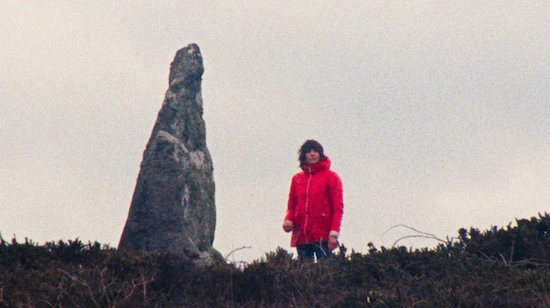
Although the result of circumstance rather than design, almost all of Nigel Kneale’s produced scripts are set in Britain. As a result, his canon can be read as a dark chronology of its social and political development from post-war scarcity through the social dislocation of the 60s and the industrial strife and advent of corporate dominance in the 70s. Kneale did make one foray into Hollywood, penning the original script for Halloween III: Season of the Witch. By all accounts, it was heavily rewritten and little of Kneale’s vision made it to screen. Not something that can be said for his farewell to his most enduring character, which, once again, was very much a British affair.
Starring John Mills, and featuring a stripped-down title, Quatermass was broadcast on ITV in October 1979. By this time Nigel Kneale was in his fifties, and the series very much reflects the concerns of a man confronting old age amidst a changing society. The punk-like gangs turning streets into war zones, and the hippy-ish Planet People, embody a younger generation that, by the late 70’s, was no longer willing to meekly comply with the societal norms accepted by their parents and grandparents. But in Kneale’s vision of a rapidly collapsing near-future Britain, youth rebellion has accelerated to the point where it represents an existential threat.
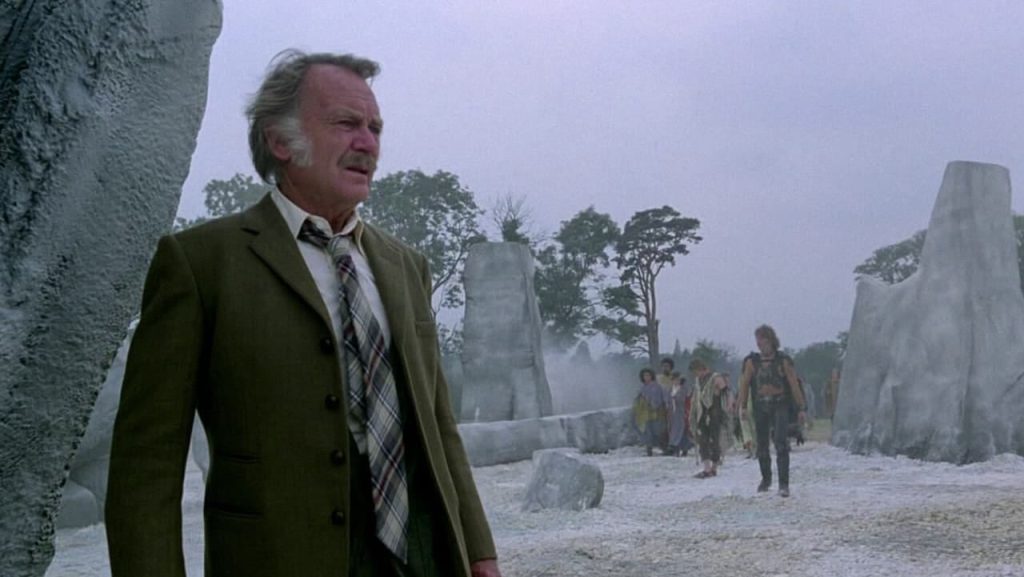
It is to Nigel Kneale’s credit that he conveys this intergenerational tension with a deft even-handedness, displaying scant reluctance in lambasting the failings of his own generation. “I’m ashamed think that I might have contributed in any way to this disgusting charade,” Quatermass states with bald honesty during a TV interview to mark the occasion of a joint US/Soviet space mission. He then proceeds to excoriate the destructive self-interest of the modern world and the protracted insanity of superpower rivalry. Clearly, this incarnation of a once ambitious scientist has accepted the defeat of his dreams and now only seeks the return of his granddaughter who has run off to join the Planet People.
This theme is further emphasised when Quatermass stumbles upon a group of elderly people eking out an existence in a scrapyard. His employment of these discarded members of a moribund class leads to a key discovery regarding the nature of the enemy. Hence, Kneale warns us; in throwing our collective wisdom upon a literal scrapheap, we imperil our future.
The violence and disaffection of the young, we discover, is the result of signals beamed out by an approaching alien presence. Driven by some kind of psychic force, youthful minds lose their autonomy and gather around ancient ritual sites whereupon they are vaporised en masse in a blinding flash of energy. The aliens are not intent on invasion but engaged in harvesting sentient lifeforms.
Enlisting the aid of the military, Quatermass determines to warn the harvesters off with a nuclear explosion, hoping this display of technological progress will spare the inhabitants of Earth, “Like a man stepping on a hornet.” As Quatermass awaits the self-sacrificial pushing of the button, Kneale treats us to a rumination on the nature of evil which borders on the Lovecraftian in echoing the insignificance of humanity in so vast a universe: “Perhaps evil is always something else’s good. Perhaps it is a cosmic law.”
Nigel Kneale passed away in 2006, lauded by many for his singular vision and influence not just on British television, but science fiction and horror in general. Admirers include John Carpenter and Joe Dante, with echoes of Kneale’s work present in The X-Files (for which he declined an invitation to write) and The League of Gentlemen. It’s also been a seminal influence on my own post-apocalyptic novels Red River Seven and The Feeding. The longevity of his career and quality of his writing ensure that Kneale’s canon, via the lens of catastrophic speculation and supernatural horror, forms a chronological critique of Britain in particular, and the eternal follies of humanity in general.
The Feeding by Anthony Ryan
‘[A] pulse-pounding vampire tale . . . Ryan keeps readers on the edge of their seats. Fans of The Last of Us will be enthralled’ Publishers Weekly
‘A frenetically-paced read that will equally excite and terrify you’ FanfiAddict
Layla has spent her entire life in the Redoubt, one of the last bastions of humanity in a ravaged world. She’s never been beyond the Redoubt’s walls; only Crossers, with their special training and survival skills, are permitted to venture into the shadow-haunted wastelands.
When Layla’s father falls ill, she knows she needs to find a cure. But no such medicine can be found within the Redoubt. Instead, her only chance is to pass a series of gruelling trials to become a Crosser, and then to strike out into the wilderness.
Where the feeders are.
Internationally bestselling fantasy author Anthony Ryan – writing as A. J. Ryan – delivers a nerve-shredding horror novel where humans are no longer top of the food chain.
Praise for A. J. Ryan
‘Bursts onto the page like a riveting ride into a monstrous heart of darkness, starting out as a locked-room mystery and steadily stomping the gas to become an edge-of-your seat thriller’ Craig DiLouie
‘A madly entertaining amalgam of locked-room mystery, heart-racing thriller, and terror-inducing horror show that will keep you up late into the night and darken your dreams long after you turn the last page’ Philip Fracassi
‘Soaked in terror and shrouded in fog, this book demands to be gulped down in one sitting’ Andy Merino
‘A frenetically paced, galvanizing read that will equally excite and terrify you’ FanFiAddict

Anthony Ryan lives in London and is the New York Times bestselling author of the Raven’s Shadow series and Draconis Memoria series. He previously worked in a variety of roles for the UK
government, but now writes full time. His interests include art, science, and the unending quest for the perfect pint of real ale.
Horror Features on Ginger Nuts of Horror
If you’re a fan of spine-chilling tales and hair-raising suspense, then you won’t want to miss the horror features page on The Ginger Nuts of Horror Review Website. This is the ultimate destination for horror enthusiasts seeking in-depth analysis, thrilling reviews, and exclusive interviews with some of the best minds in the genre. From independent films to mainstream blockbusters, the site covers a broad spectrum of horror media, ensuring that you’re always in the loop about the latest and greatest.
The passionate team behind The Ginger Nuts of Horror delivers thoughtful critiques and recommendations that delve into the nuances of storytelling, character development, and atmospheric tension. Whether you’re looking for hidden gems to stream on a dark and stormy night or want to explore the work of up-and-coming horror filmmakers, this page is packed with content that will ignite your imagination and keep you on the edge of your seat.
So grab your favourite horror-themed snacks, settle into a cosy spot, and immerse yourself in the chilling world of horror literature and film. Head over to The Ginger Nuts of Horror and embark on a journey through the eerie and the extraordinary. It’s an adventure you won’t soon forget!

